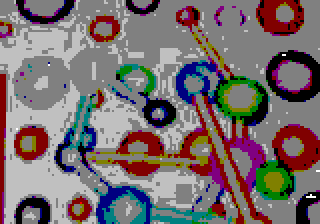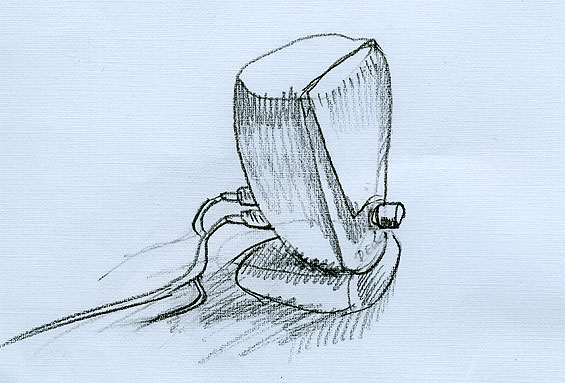View current page
...more recent posts

"The ashy, veiny hand reaches out, gas pump nozzle in hand, a stream of 'S'es pouring forth from its spout like precious drops of gasoline. Together, the hand and pump give off an eerie glow as Honest Abe looks onward, his gaze obstructed by an exaggerated dot screen. George Washington is barely visible, shrouded by an orange shadow of depression. The message is clear: Rockland County joins gas sales tax capping."
From a great, mercilessly cruel, blog post from Ironic Sans on The Art of 1010 WINS. (via mo, mbs, et al) "The radio station 1010 WINS is for New York City what CNN Headline News is for cable television. Itís just nonstop headlines, weather, and traffic, repeating every 22 minutes. Their slogan is, 'You give us 22 minutes, and weíll give you the world.' Their website, 1010WINS.com, features local headlines and news stories mixed in with syndicated newswire stories. But for me, the real treat is the unintentional art gallery at 1010WINS.com. Sometimes, 1010 WINS uses photos from the newswire. But often, some Photoshop
1010 WINS also does unbearable audio montages, something I was complaining about on this blog on September 12, 2001.
Tonight at 8:00 at the Brooklyn bookstore BookCourt I'll be talking with Ed Halter about his book From Sun Tzu to Xbox: War and Video Games (Thunder's Mouth Press/Avalon, 2006), covering a range of topics rather pertinent to what has been called either World War III or World War IV, depending on whether you're listening to former House Speaker Newt Gingrich or former CIA director James Woolsey. These include, most centrally, America's Army, a realistic game developed by the military as both a recruiting and training tool, but also combat simulators flacked at high tech trade shows, behaviorist game designers concerned with "making memories" in players, Americans blowing away virtual Bin Ladens after 9/11, games such as "Under Ash" and "Under Siege" marketed to the "Arab Street," and American activist/left hacks of violent games. The announcement for the event is a here; earlier posts about the evening are here and here. I hope to see you there.
8:00 pm
BookCourt
163 Court Street
Brooklyn NY 11201
map and directions

Highly recommended: video by Oliver Laric [Quicktime .mov] titled 787 Cliparts, via the Rhizome.org blog. It's 787 frames of generic cartoon line drawings (known as "clip art" from the days when people used scissors) blended together into a stop-motion animation. The flow is quite dazzling and lyrical. It recalls the Aeon Flux episode "Chronophasia," where Aeon becomes unstuck in time and transforms into hundreds of historical characters, rapidly changing costumes and hairstyles, as she walks across the room. And it's a vast improvement over the rather nauseating "scramble suit" in Richard Linklater's misbegotten A Scanner Darkly. (Prediction: 14 years from now Linklater will release a director's cut of that film restoring all the live action footage he shot, and do a big mea culpa for burying Robert Downey Jr. and all the great Philip K. Dick dialogue behind an obnoxious Photoshop filter. One cries for what that film could have been. Downey is a perfect Barris and the "sitting around the crash pad" scenes are as hilarious as they are in the book.)
Also recommended: Satellite Jockey's "Low Pressure (Sound) System Mix" [18 min / 20 mb .mp3], consisting of the geosat/bleepcentric pieces below. Gritty, sonically stimulating, often quite pretty:
1. Vladmir Ussachevsky - Wireless Fantasy
2. Kaffe Matthews - She could
3. Kid 606 - Site Specific Sound Installation
4. Alva Noto - 06-f117.tiff
5. Fennesz - Before I Leave
6. AGF - Loading
Better get it fast, SJ (aka Rick Silva) is notorious for removing great material from the web right after he posts it.

Ed Halter, whose book From Sun Tzu to Xbox: War and Video Games we'll be discussing at BookCourt in Brooklyn tomorrow night (y'all come!), referred me to this discussion at Henry Jenkins' blog about video game criticism and the topic of "why don't games have their Lester Bangs or Pauline Kael?" You could substitute "electronic/digital art and music" for games in that discussion and most of it would be relevant: that the critics will emerge in a generation from the ranks of kids consuming the products now, that criticism does exist but mostly on blogs and chatboards and not the established print publications, etc. Games have a different problem in their climb to mainstream acceptance, which is that, as one commenter pointed out, the experience varies so much from one consumer/player to another--and not just for the usual reasons of "the squishy subjectivity of art" but because the game has decision trees that could result in completely unlike experiences for the novice and the advanced player. In an earlier post I described the pleasures of watching my nephews playing Super Mario 64. They're experts so I got more out of being a spectator than I ever would have gotten as an inept player. The "game art" Halter describes in his book that I think I'd like best are the pieces that take apart the games and reassemble the fragments as "objects of contemplation," for example, Workspace Unlimited's Diplomatic Arena, which consists of world leaders and villains indiscriminately slaughtering each other to a montage soundtrack. Some earlier thoughts of mine on the "problem of interactivity" are here and here.
Bern, of the 8-Bit rockin' duo Bodenstandig 2000, on why he doesn't like the iPod:
We know that mp3 is part of our relative poverty, but Apple's proprietary digital rights management is an extremely stupid answer. I am the engineer-like type of guy (or at least an engineer-sympathizer) and I still canít get over these now-so-common crippling of technical possibilities. Appleís iPod? Yes, they look good and maybe they are the last bastion of classical brAun-like industrial design vs. chinese-turkish styling-trash for pimps and bitches, but still: They are crippled and I donít buy one.I agree with this. As a nascent mp3-making musician, I would rather get the product out there via "the chinese-turkish" free mp3 sites that link to me than use iTunes. At home I use Winamp to play music by others, because it doesn't stink of some kind of monopolistic capitalist scheme. Information wants to be free. (What a quaint idea!) The extent of my own capitalism is, send me 10 bucks and I'll send you a CD-R with as much music as I can put on it. For the money you get higher res recordings, the music all in one place, and no time-consuming downloading. You can rip the songs, whatever, just don't pass it off as your own work. My address is on my faq page. Check or money order to "Tom Moody."
1. You cannot just copy a song to an iPod and play it, youíll need iTunes.
2. If you buy a Bodenstandig-song at iTunes, you cannot play it on every mp3-player, you need an iPod.
"Aruba '85" [3.1 MB .mp3]
We're having sort of a heat wave here: nothing compared to Texas summers, but I'll go along with it. In honor, this piece has kind of a jazzy, tropical, Latinate feel. I wrote the melody fairly quickly a few days ago but felt it still needed something, so I busted my hump writing some harmony parts. I wish I could say I learned something about chord theory but I'm still doing everything mostly by ear. The challenge was to write additional notes and variations on the main theme without losing the original syncopated character of the verses. On the third iteration there's a kind of barrelhouse thing that's not very Latin, but it's interestingly quirky and lilting so I left it in. The "bass" is the characteristic Mutator twang bending some tuned drum notes--it stays constant through the piece, maybe too constant, but it's only 2 minutes. The rest is percussion from various sources.
Update: I guess I should mention that just because I said the piece "has kind of a jazzy, tropical, Latinate feel" doesn't mean it is jazzy, tropical, Latinate song. I think it's an "art piece" in that the repeating electronic bass line is static and trancelike in its textures and the jaunty electronic piano parts seem to be imparting forward momentum the piece doesn't have. Thus those iterative piano parts hang like fruit in jello to be individually considered for their simple but rather classically fabricated harmonic structures. The song is supposed to be problematic but also fun and pleasurable in a way I think a lot of 20th Century music wasn't.
Update 2: I took out the griping in the above update--that's a constant temptation with a blog. Thanks to Pierre for listening and documenting the process of recording this piece on his end--he is turning surfing into a Fluxus event with his series on listening to music.
